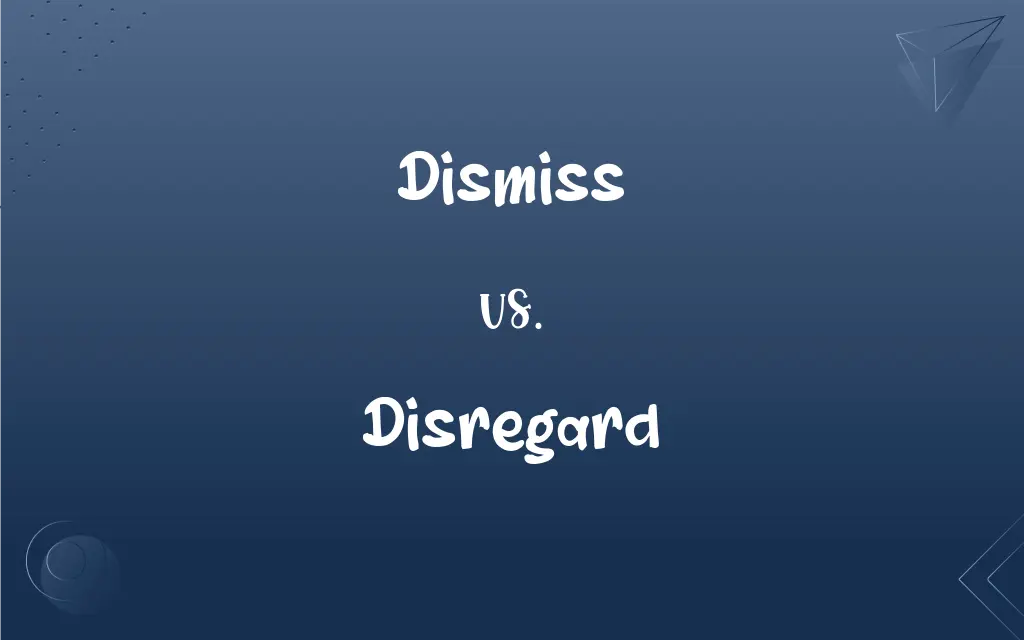Dismiss vs. Disregard: What's the Difference?
Edited by Aimie Carlson || By Janet White || Updated on September 29, 2023
Dismiss implies a conscious, active removal or rejection of something or someone, often from a position or consideration. Disregard means to pay no attention to, usually passively ignoring something or someone.

Key Differences
Dismiss and disregard both pertain to ignoring or neglecting something, but they differ in intent and scope. Dismiss generally implies an active decision to remove or reject something. For example, a manager can dismiss an employee. Disregard, on the other hand, is more passive and involves ignoring or not paying attention to something or someone.
When talking about ideas or suggestions, to dismiss something often means you've considered it and deemed it unworthy of further attention. Disregard, however, may imply that you didn't give the matter any thought or consideration at all. One can disregard safety warnings, but dismissing them usually means you've evaluated and rejected their significance.
Dismiss is often used in formal, legal, or institutional contexts, like dismissing a case or an employee. It carries with it a certain authority. Disregard is less formal and could apply to anything that can be ignored, such as disregarding a casual piece of advice.
In everyday language, dismiss and disregard can often be used interchangeably, but their nuances become important in specific contexts. For example, in a court of law, a judge would dismiss a case, not disregard it, because the action is formal and deliberate. Conversely, you would disregard a distracting noise, not dismiss it, as there's no formal action being taken.
Dismiss usually involves a following action or consequence, like being removed from a job. Disregard doesn't necessarily imply that anything will happen as a result. You could disregard someone's advice without any formal or immediate consequence.
ADVERTISEMENT
Comparison Chart
Level of Activity
Active
Passive
Formality
More formal
Less formal
Intent
Often deliberate
May be unintentional
Consequence
Often has one
Less likely to have one
Consideration
Usually involves it
May not involve it
ADVERTISEMENT
Dismiss and Disregard Definitions
Dismiss
To order or allow to leave.
The teacher dismissed the class early.
Disregard
To have no care or concern for.
They disregarded her feelings.
Dismiss
To decide not to think about or consider.
She dismissed his comments as irrelevant.
Disregard
To ignore or neglect deliberately.
He disregarded the rules.
Dismiss
To terminate the employment of.
The company dismissed several employees.
Disregard
To treat as unworthy of consideration.
She disregarded his advice.
Dismiss
To put out of judicial consideration.
The judge dismissed the case.
Disregard
To overlook or neglect.
I disregarded the typos in the email.
Dismiss
To reject serious consideration.
The idea was quickly dismissed.
Disregard
To pay no attention to.
He disregarded the warning signs.
Dismiss
To end the employment or service of; discharge.
Disregard
To pay no attention or heed to; ignore
We disregarded your advice.
Dismiss
To direct or allow to leave
Dismissed troops after the inspection.
Dismissed the student after reprimanding him.
Disregard
To show no evidence of attention concerning (something)
Conduct that disregards risks to others.
Dismiss
To stop considering; rid one's mind of; dispel
Dismissed all thoughts of running for office.
Disregard
To treat without proper respect or attentiveness.
Dismiss
To refuse to accept or recognize; reject
Dismissed the claim as highly improbable.
Disregard
Lack of thoughtful attention or due regard.
Dismiss
(Law) To adjudicate (a cause of action) as insufficient to proceed further in court because of some deficiency in law or fact.
Disregard
The act or state of deliberately not paying attention or caring about; misregard.
The government's disregard for the needs of disabled people is outrageous.
Dismiss
To eject (a player or coach) for the remainder of a game.
Disregard
(transitive) To ignore; pay no attention to.
Dismiss
To put out (a batter) in cricket.
Disregard
Not to regard; to pay no heed to; to omit to take notice of; to neglect to observe; to slight as unworthy of regard or notice; as, to disregard the admonitions of conscience.
Studious of good, man disregarded fame.
Dismiss
(transitive) To discharge; to end the employment or service of.
The company dismissed me after less than a year.
Disregard
The act of disregarding, or the state of being disregarded; intentional neglect; omission of notice; want of attention; slight.
The disregard of experience.
Dismiss
(transitive) To order to leave.
The soldiers were dismissed after the parade.
Disregard
Lack of attention and due care
Dismiss
(transitive) To dispel; to rid one’s mind of.
He dismissed all thoughts of acting again.
Disregard
Willful lack of care and attention
Dismiss
(transitive) To reject; to refuse to accept.
The court dismissed the case.
Disregard
Refuse to acknowledge;
She cut him dead at the meeting
Dismiss
(transitive) To invalidate; to treat as unworthy of serious consideration.
By telling the victim to "get over it", the listener dismissed the victim's feelings.
Disregard
Bar from attention or consideration;
She dismissed his advances
Dismiss
(transitive) To send or put away, to discard with disregard, contempt or disdain. (sometimes followed by as).
She dismissed him with a wave of the hand.
Disregard
Give little or no attention to;
Disregard the errors
Dismiss
To get a batsman out.
He was dismissed for 99 runs.
Dismiss
To give someone a red card; to send off.
Dismiss
To send away; to give leave of departure; to cause or permit to go; to put away.
He dismissed the assembly.
Dismiss their cares when they dismiss their flock.
Though he soon dismissed himself from state affairs.
Dismiss
To discard; to remove or discharge from office, service, or employment; as, the king dismisses his ministers; the matter dismisses his servant.
Dismiss
To lay aside or reject as unworthy of attentions or regard, as a petition or motion in court.
Dismiss
Dismission.
Dismiss
Bar from attention or consideration;
She dismissed his advances
Dismiss
Cease to consider; put out of judicial consideration;
This case is dismissed!
Dismiss
Stop associating with;
They dropped her after she had a child out of wedlock
Dismiss
Terminate the employment of;
The boss fired his secretary today
The company terminated 25% of its workers
Dismiss
End one's encounter with somebody by causing or permitting the person to leave;
I was dismissed after I gave my report
Dismiss
Declare void;
The President dissolved the parliament and called for new elections
FAQs
What does dismiss mean?
Dismiss means to consciously remove or reject something or someone, often following consideration.
Can you use dismiss and disregard interchangeably?
They can often be used interchangeably, but they have nuances that make them different in specific contexts.
Does disregard imply ignoring?
Yes, disregard usually implies ignoring or paying no attention to something or someone.
Is dismiss a more formal action?
Generally, yes. Dismiss is often used in formal, legal, or institutional settings.
Does disregard mean you didn't consider?
Often, yes. Disregard may imply you didn't give the matter any thought.
Does dismiss require authority?
Often, yes. Dismiss implies a level of authority to remove or reject.
Can you dismiss without considering?
Generally, no. Dismiss usually implies some level of consideration before removal or rejection.
What does disregard mean?
Disregard means to pay no attention to or ignore something or someone, often passively.
Does disregard involve active ignoring?
Generally, no. Disregard is more often a passive form of ignoring.
What's the key difference between the two?
The key difference is in the level of activity: dismiss is active and often involves consideration, while disregard is passive and may not.
Are these words context-dependent?
Yes, the nuances between dismiss and disregard become important in specific contexts.
Does dismiss have consequences?
Often, yes. Dismissing usually involves a following action or consequence.
Can disregard be unintentional?
Yes, one can disregard something without intending to.
Does disregard have consequences?
Not necessarily. Disregard doesn't imply any formal or immediate consequence.
Are they synonyms?
While similar, they are not perfect synonyms due to differences in activity level, formality, and intent.
About Author
Written by
Janet WhiteJanet White has been an esteemed writer and blogger for Difference Wiki. Holding a Master's degree in Science and Medical Journalism from the prestigious Boston University, she has consistently demonstrated her expertise and passion for her field. When she's not immersed in her work, Janet relishes her time exercising, delving into a good book, and cherishing moments with friends and family.
Edited by
Aimie CarlsonAimie Carlson, holding a master's degree in English literature, is a fervent English language enthusiast. She lends her writing talents to Difference Wiki, a prominent website that specializes in comparisons, offering readers insightful analyses that both captivate and inform.































































